What! You’re going to be a teacher?
Host: Isolated Children’s Parents’ Association
Written by Tannas Godfrey, ‘Barrygowan’ Station, Cunnamulla QLD.
We live on ‘Barrygowan’ Station in South West Queensland, the Queensland/New South Wales border runs through the middle of our property aggregation. Our closest major towns are Cunnamulla which is 150km north west in Queensland and Bourke which is 230km south west in New South Wales. My husband was born and bred in Cunnamulla and we met through a mutual friend that was posted to Cunnamulla as a Police Officer. We moved to Barrygowan in 2010 after securing my discharge from the military and gaining some great experience working in Mackay at the Dalrymple Bay Coal Terminal.
The Barrygowan homestead had been uninhabited for over 10 years when we moved back and we had a solid couple of years work to bring it up to the standard to see our family start in December 2012. Unfortunately, due to drought again in 2014, we moved into town to allow me to earn a regular off-farm income at the local Council. Our son was born in December 2015 and the following 2 years were hard for our young family, with Dad working at the farm during the week and trying to catch up on weekends, so we decided in 2017 to move back to Barrygowan as it coincided with my daughter finishing Kindergarten and commencing her Prep year which we could do through Distance Education – better known as ‘School of the Air’.
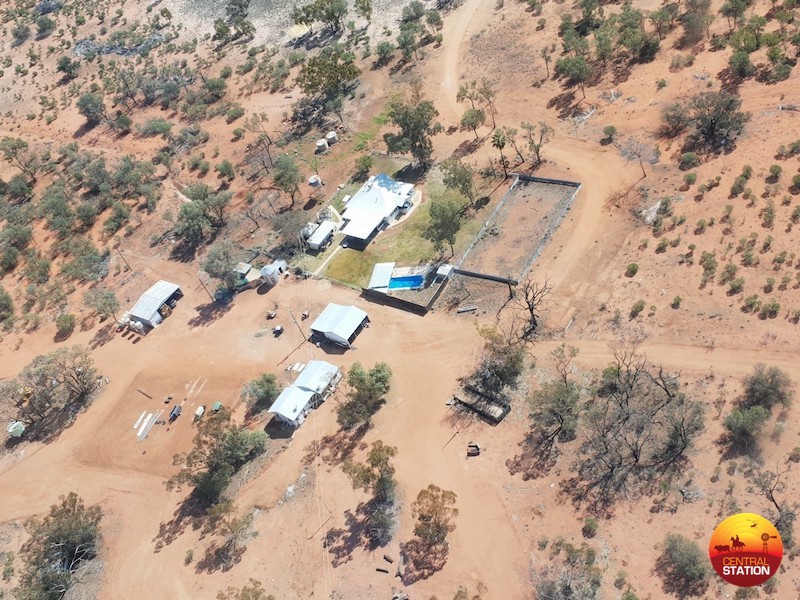 ‘Barrygowan’ Station, the schoolroom and accommodation is the building at picture bottom.
‘Barrygowan’ Station, the schoolroom and accommodation is the building at picture bottom.
So what is Distance Education or DE as we call it?
Well let’s start with what it is not. If you look at Google, Instagram or home-school blogs you will see many definitions. In the media, the reasons for DE are often confused with the choice to home-school. Home-schooling is a parent or carer choice that may come about through feelings of social or psychological distance; it may be needed because of a families or child’s work, medical or behavioural requirements or simply a choice to be free from a set school curriculum. Home-schooling does not require you to enrol at a ‘Distance Education’ school and it allows for a parent, carer or tutor to carryout assessments and other school work in accordance with each parent’s personal schooling choices.
So what is DE? DE for outback families means that we are geographically isolated, and even if we really, really, really, want our kids to go to mainstream school, the distances involved in getting them there are just too vast. So, like many farming families across the country, in 2018 we officially became a DE family with the Charleville School of Distance Education.
I embarked on this year with absolutely no idea, research or expectations having decided to be the Home Tutor (HT) for my daughter. At this point I should explain that we use the term Home Tutor (who may be qualified or not), so we are not confused with Governesses (who may tutor, nanny or both) or Teachers (who must be degree qualified and accredited in teaching).
When I announced my HT intentions to my family, I got mixed reactions – my brother just burst out laughing and said “good luck!” My mother gave me that concerned look of ‘how on earth are you going to fit/do this along with everything else on the farm – and by the way do you know anything about what you have to do?’ but just said “that sounds pretty full-on”. My husband, who is a child of School of the Air (when they still used UHF radios) just had the uppermost confidence and said “You’ll be right, just get into it”. If I am really honest, the main reason I wanted to be the HT for at least our first year was so I understood what was involved with teaching and learning by DE before I considered hiring anyone to do the job.
The first thing that took me by surprise is the gear! Oh my goodness, the gear that gets sent to you by the school freaked me out and made me stop and think what I was taking on! Simply, here is a bit of a list that turns up over 2 mail runs before you even start:
- 3 large A3 satchels each 4 inches thick – packed with books, curriculum and instructions.
- 2 large plastic boxes 60cm x 60cm x 30cm – packed with learning aids and educational toys.
- A telephone and headset to allow conference calling.
- A laptop and accessories provided under lease from Department of Education with all programs loaded up and ready to go.
On top of what the school supplies, you still have to go to a store and grab all your normal pens/papers/scrapbooks etc. My one piece of advice to any new Prep DE family is get 3 x the quantity of recommended glue sticks, boy there is some gluing involved.
Our school uses the Queensland Department of Education ‘Curriculum into the Classroom’ or C2C materials which are designed for teachers in small schools, multi-age classrooms and DE schools. Obviously in DE schools it is the HT’s job to read, interpret and teach these vast volumes and I can tell you, for the unqualified HT, they have been challenging.
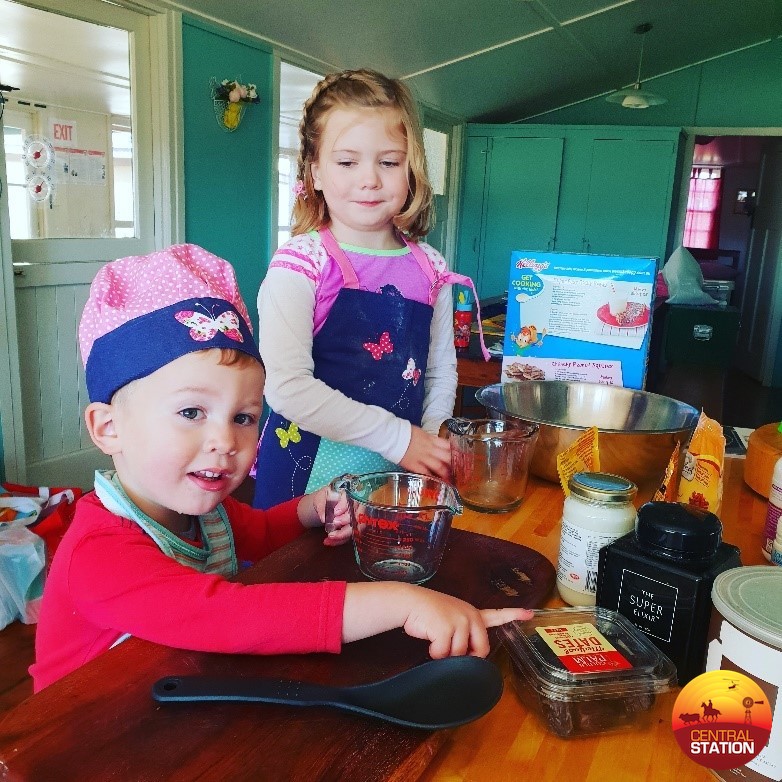 The family joins in for a C2C Health and Physical Education lesson on healthy eating.
The family joins in for a C2C Health and Physical Education lesson on healthy eating.
The set up of the school room was more enjoyable than I had thought. Search ‘Homeschool’ on Pinterest and see what some very creative people come up with. Me, not so much but I have tried to make sure that it is as fun and resourced as possible as we spend quite a bit of time there.
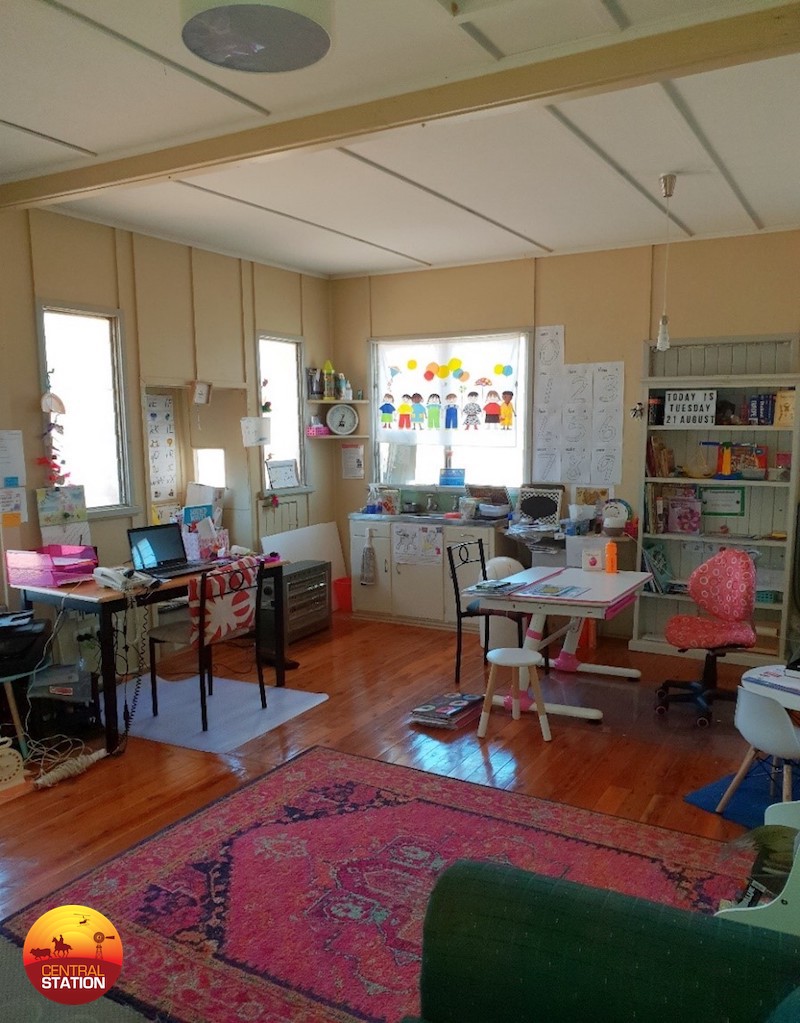 The main area of our classroom, we converted part of the staff accommodation.
The main area of our classroom, we converted part of the staff accommodation.
Generally, our school day is from 8:00am to 2:00pm with an hour for lunch and longer if it is a big curriculum week. Two days a week we do an additional ½ hour of piano lessons over the phone with the wonderful Miss Ruth Drew who is amazing and one of the best things I have found in the ICPA News and Views Magazine was her contact details!
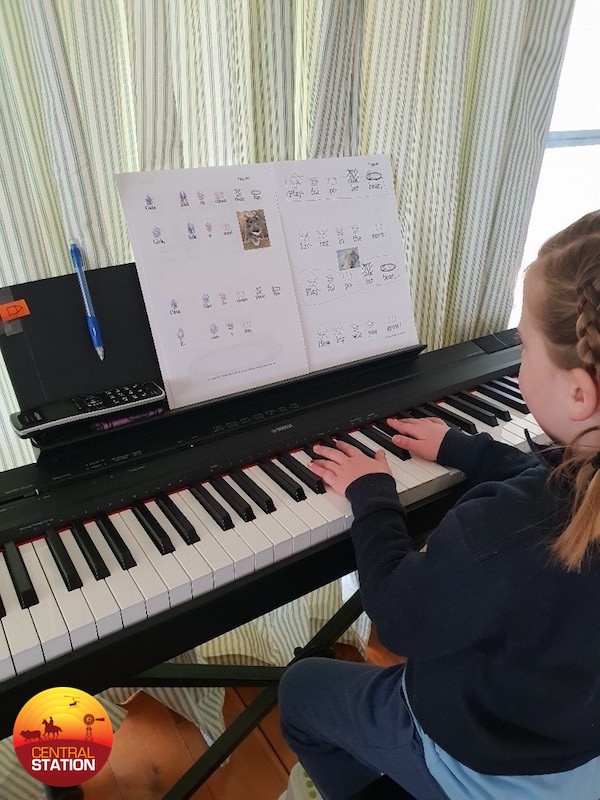 Completing a piano lesson over the phone with the amazing Miss Ruth Drew.
Completing a piano lesson over the phone with the amazing Miss Ruth Drew.
One of the first things you notice as a new HT, as opposed to a younger HT or Teacher is that things have changed since we were at school. I remember sitting in our DE school on-campus training thinking “what language are they speaking?”. Things like ‘sight words, phonemes, graphemes, back to front maths, guided inquiries’ were all totally new to me and I had to learn what they were in order to teach them.
The other thing I find myself constantly reflecting on is “Do they really need to know that in Prep?”
I will give you an example here.
Science in Term 2 required us to teach our Prep students how to identify features of a place, be able to explain how to locate those features “the x is on top of the y beside the z” and draw a pictorial birds-eye-view map displaying the features. Try as I might I just couldn’t get this across to my daughter, I mean she is 5! We were both getting really frustrated, when I had an idea. The next day, instead of starting in the classroom we headed down to the plane and jumped in. I took her up for ½ an hour and we discussed how different the house buildings and farm things looked from the air and how that if we were a bird this is how you would see the features, finally it clicked, yay for us!
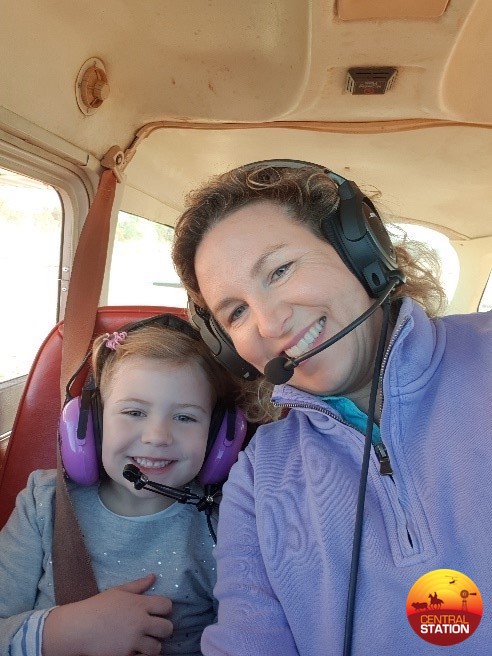 Off in the plane to do our ‘birds-eye-view’ lesson.
Off in the plane to do our ‘birds-eye-view’ lesson.
Technology is a big part of the DE classroom in today’s world. We have ‘on-air’ time every day and the quantity varies with student’s age and activities. For Prep, we have 1 hour of face to face in a virtual classroom. A virtual classroom is where each of the students interact with the DE School Class Teacher in a lesson where they complete activities and talk to each other and read together. In addition to this one hour there are also individual fortnightly ‘one on one’ sessions where the Class Teacher checks and tests my daughter’s performance against curriculum markers and I am able to seek assistance and give/receive feedback. There are also art clubs, reading clubs and girl guide clubs that are all optional to join and work in a virtual classroom where all children can interact. I will admit that I could not work the virtual classroom technology beyond a very basic standard and it was through my daughter’s participation in the ‘Junior Jamboree’ club that we both learnt together and are now very proficient. My daughter went from never using a computer to be able to open files, operate drawing tools and move herself between menu’s using drop down options in a matter of months, it is truly amazing to see how quickly kids learn.
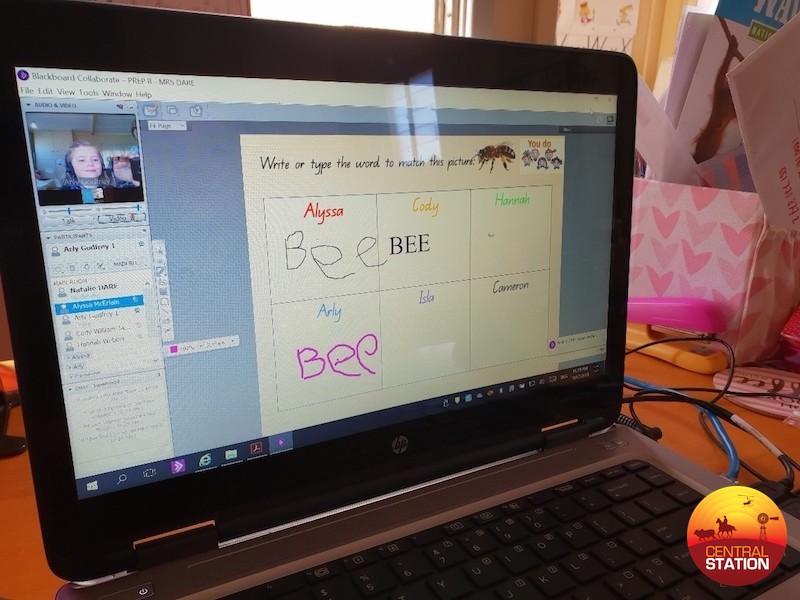 A close up of the virtual classroom for on-air lessons. Students write on the touch sensitive screen, can see each other and the teacher with audio and video feeds.
A close up of the virtual classroom for on-air lessons. Students write on the touch sensitive screen, can see each other and the teacher with audio and video feeds.
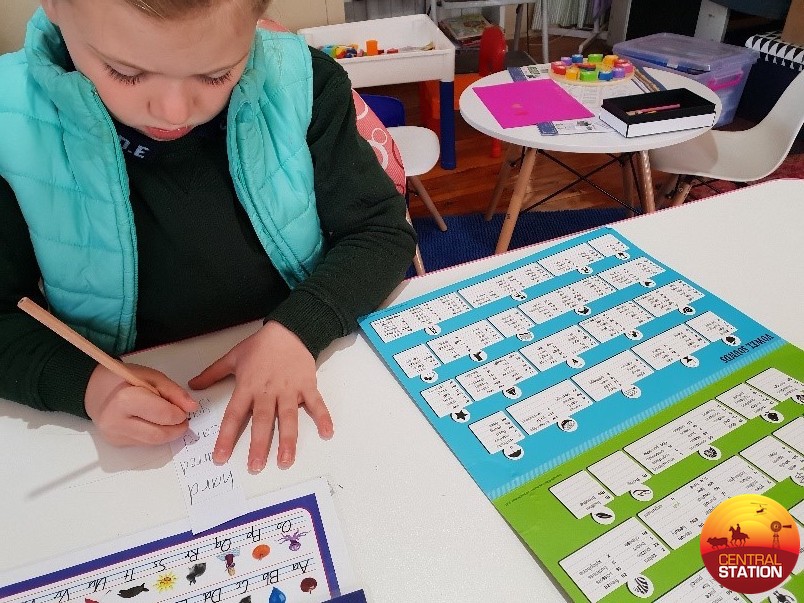 Learning to write using phoneme (sound) and grapheme (letter) knowledge
Learning to write using phoneme (sound) and grapheme (letter) knowledge
We have our good days and our bad days in the classroom, it is a challenge when you are a parent and a HT. We make sure that no matter how good/bad a day is we leave it in the classroom and don’t bring it into our home, this keeps it normal for us.
In my opinion, DE would not be what it is without 2 things: the Isolated Children’s and Parent’s Association (ICPA); and the support of Governesses/Home Tutors. The ICPA continues to support geographically isolated rural and remote children and their families so that we have equal access to education and educational initiatives and programs. The role of the Governess and/or Home Tutor is also so critical. Many families require a Governess to look after smaller children whilst parents teach in the school room or alternatively the Home Tutor is employed to teach whilst parents are busy with farm work and in some cases they do both. Governesses and Home Tutors are generally recruited by families using Facebook or Gumtree as the positions and what they involve are very different to standard recruiting. There are never enough of these fabulous people to fill all the positions we need here in with our DE families and I would encourage anyone to give it a go – travel the country, experience farm and station life and contribute to the education of kids.
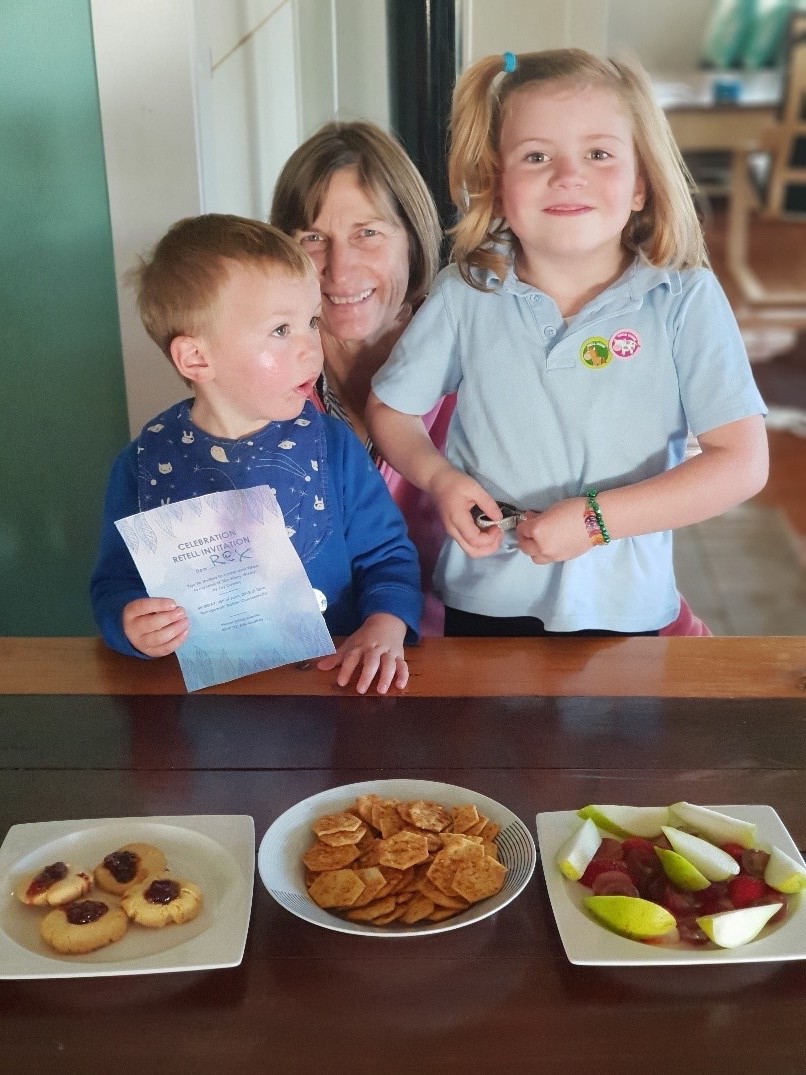 Our Governess, Carey with her biggest fans!
Our Governess, Carey with her biggest fans!
In Term 4, I am so privileged to have an Aussie Helpers Volunteers for Isolated Children’s Education (AHVISE) volunteer coming. She is a retired teacher, who will come to our property to teach my daughter for a month in November. We are so lucky to receive this volunteer, who I’m sure will give us both some on the ground feedback and inspiration in our final weeks of the year! Here is to successfully completing our first year of DE, it has been a necessary and fantastic experience!
